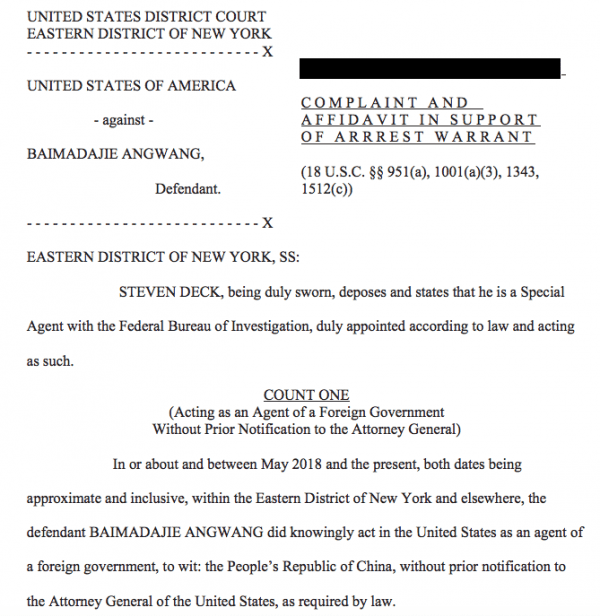
A New York City police officer and Williston Park resident accused of supplying Chinese officials with information on Tibetans living in the United States was released on a $2 million bond after testing positive for the coronavirus Wednesday, according to Newsday.
Baimadije Angwang, a 33-year-old man and native Tibetan prior to coming to Williston Park, was released from the Metropolitan Detention Center in Brooklyn Wednesday after four months, according to Newsday.
John Carman, Angwang’s Garden City-based attorney, confirmed his client’s release on Wednesday afternoon.
“Mr. Angwang is free today on the strength of 13 people who believed in him so much that they committed to a two million dollar bond. He is going to enjoy an evening with his wife and daughter,” Carman said. He said the trial will occur in two years.
Efforts to reach representatives from the Eastern District Court for comment on the matter were unavailing, but federal prosecutor Matthew Haggans opposed the release, according to Newsday.
Newsday said U.S. District Judge Eric Komitee, who presided over the case noted that Angwang’s situation “had notably changed”, after previously denying Angwang bail.
Komitee and an appeals court increased the bond from $1 million to $2 million, according to Newsday.
Komitee also referred to prosecutors not opposing bail for others accused of being Chinese agents in seperate, unrelated cases and certain special procedures that are taken into consideration with a case surrounding sensitive security intel as a reason to grant Angwang bail.
According to officials, Angwang faces up to 55 years’ imprisonment if found guilty. Court documents showed that Angwang told his official handler from China that he wanted to get promoted by the NYPD so he could bring “glory to China.”
FBI Special Agent Steven Deck outlined Angwang’s alleged actions in a criminal complaint that was unsealed earlier in federal court in Brooklyn.
Deck said Angwang “maintained a relationship” with at least two Chinese consulates since approximately 2018, according to court documents.
Angwang allegedly contacted one consulate cellphone at least 53 times from 2014 to 2017, according to court documents.
One of the consulates, Deck said, was believed to be assigned to a subdivision of China’s United Front Work Department, responsible for “neutralizing sources of potential opposition to the policies and authority of the [People’s Republic of China].”
Tibet, according to the court documents, is an “autonomous region” in China, historically home to ethnic Tibetans and the spiritual home of Tibetan Buddhism. Since 1951, when China occupied Tibet, a Tibetan independence movement for political separation from China has been present throughout the region, according to the documents.
Thousands of ethnic Tibetans were believed to have been killed during periods of martial law and repression, according to the documents.
Angwang, according to court documents, was assigned to the 111th Precinct in Queens and served as a patrol officer and a member of the precinct’s crime prevention team. He was also a staff sergeant in the U.S. Army Reserve stationed in Fort Dix, New Jersey.
Angwang allegedly used his position in the Police Department to provide the Chinese consulates access to senior police officials through invitations to official NYPD events, according to the documents.
Deck said neither of the activities fell within the scope of Angwang’s duties and responsibilities for either the NYPD or the Army Reserve.
“Had background investigators been aware of the full extent of Angwang’s contact with foreign government officials, Angwang would not have maintained his secret security clearance with the Department of Defense,” the complaint read.
Angwang also allegedly lied by denying he had contacts with foreign government officials or consulates on an electronically submitted background investigation form.
“As alleged in this federal complaint, Baimadajie Angwang violated every oath he took in this country,” NYPD Commissioner Dermot Shea said. “One to the United States, another to the U.S. Army, and a third to this Police Department.”






